Brussels, April 21 (RHC)-- The tightening of the U.S. blockade against Cuba by the current administration in the White House is an erroneous strategy with which everyone loses, Spanish MEP Javier Moreno warned in Brussels.
In an interview with Prensa Latina, the president of the Group of Friendship and Solidarity with Cuba of the 9th Legislature of the European Parliament stated that this policy re-visits the policies of the Cold War, freezing rapprochement between Washington and Havana initiated during the administration of Barack Obama, a bilateral decision applauded on a global scale.
"Unfortunately, the arrival in power of Donald Trump has meant a radical change in policy and discourse in the U.S. administration, interrupting the relationship that Obama had begun," he said.
Javier Moreno (MEP for the Spanish Socialist Workers Party) recalled the activation almost a year ago of Title III of the Helms-Burton Law, the imposition of new travel restrictions and the strengthening of the economic blockade of Cuba, which has been in place for almost six decades.
According to the member of the Group of the Progressive Alliance of Socialists and Democrats in the European Parliament, such a position not only hinders the process of economic reactivation of the island and freezes the dialogue with the Cuban government, but also denies the possibility of knowing the reality of the island that many U.S. citizens want to visit.
Asked by Prensa Latina about the extraterritorial nature of Washington's policies, which was intensified with the activation of Title III of the Helms-Burton Law, Moreno underlined the European Union's (EU) firm opposition to this rule, which is contrary to international law.
That is why it has created the Community Blockade Statute, which is a major achievement of the EU's unified action against the extraterritorial legislation of third countries, he said.
In Moreno's opinion, it is necessary to articulate at the European level a public registry system that brings together information on claims under Title III, which allows any U.S. citizen or company to file claims in U.S. courts about properties nationalized after the triumph of the Revolution on January 1, 1959.
He considered it important to establish some sort of collaborative initiative with Canada, as a non-European nation affected by extraterritoriality, "to connect the different blocking statutes and share information."
Concerning the Group of Friendship and Solidarity with Cuba in the European Parliament, constituted two months ago for the current Legislature, he highlighted the space for debate that it represents and its more than two decades of existence.
The group aims to be a framework for constructive and informal dialogue with the government and civil society to learn about the reality of the island and to strengthen the links between the Cuban and European people, based on respect for sovereignty, independence, freedom, shared values and the principles of international law.


